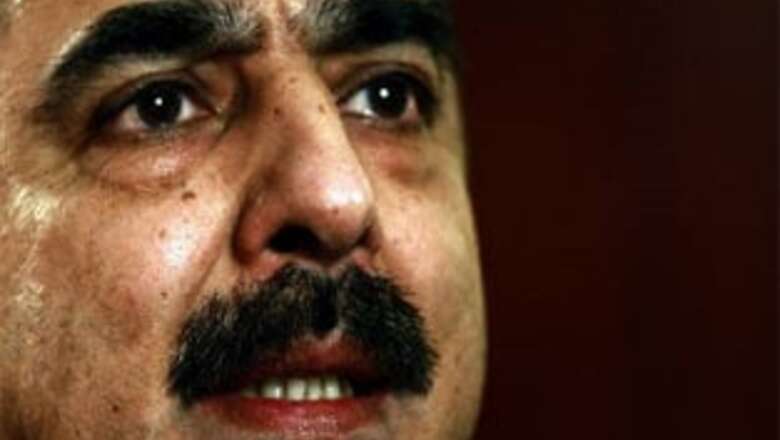
views
Islamabad: Prime Minister Yousaf Raza Gilani said on Friday that Pakistan had sent India a response to evidence from the Mumbai attacks, as US vice president-elect Joe Biden arrived on a trip aimed at easing tension in South Asia. Ties between nuclear-armed Pakistan and India deteriorated sharply after coordinated attacks by 10 gunmen on Mumbai in late November that killed 179 people.
India blamed Pakistani militants from the outset. But Indian Prime Minister Manmohan Singh said for the first time this week the assault must have had the support of "some official agencies" in Pakistan.
Pakistan has denied involvement by state agencies and said Singh was ratcheting up tension. Pakistan confirmed on Wednesday the lone surviving gunman from the attack was Pakistani, and Gilani said on Friday Pakistan's main security agency had sent India a response to a dossier of evidence from the attacks India presented this week.
"Our ISI has given their feedback," Gilani told reporters referring to the military's Inter-Services Intelligence agency. He did not elaborate but said Pakistan would cooperate if more information was required.
India said the evidence linked Pakistani militants to the attacks, and it included data from satellite phones and the surviving attacker's confession. Gilani said it was regrettable India had frozen a four-year-old peace process that had brought better ties between the rivals who have fought three wars since 1947.
PAGE_BREAK
"The situation on our eastern border has once again become very fragile," Gilani told a seminar in Islamabad. "The world must not let tension between India and Pakistan escalate."
Biden, a Democrat and the outgoing chairman of the US Senate Foreign Relations Committee, arrived in Pakistan with Republican Senator Lindsey Graham of the US Armed Services Committee, a US embassy spokesman said. He was due to meet President Asif Ali Zardari.
IRRATIONAL, DEADLY ACTORS
While tension has been high, there has been no sign of a repeat of a 2002 troop build-up which followed an attack in New Delhi that India also blamed on Pakistani-based militants. Analysts say the chances of India resorting to military action have receded.
Pakistani officials have warned that if there was a risk of conflict with India it would move forces from its border with Afghanistan, where they are fighting Taliban and al Qaeda militants.
That would undermine a US plan to almost double the number of its troops in Afghanistan as part of a surge to quell an intensified insurgency. The tension with India has also had ramifications on Pakistani domestic politics with Gilani sacking his national security adviser on Wednesday for releasing news of the nationality of the surviving gunman before consulting him.
Gilani said he had sacked the adviser, Mahmud Ali Durrani, in the interests of the country and of governance and denied the affair had created a rift with President Zardari. Nevertheless, Lisa Curtis, a research fellow at the Heritage Foundation, said in a note the incident had demonstrated just how fragile Pakistan's internal political situation was.
Curtis also said the military's years of support for militants fighting in Afghanistan and India was costing Pakistan dearly, and its foreign and domestic policies had become hostage to the agenda of "irrational, deadly actors".
It would be a grave error for Pakistan to fail to punish those responsible for the Mumbai attack on the excuse that would appear to be succumbing to Indian pressure, she said. Indian Home Minister P Chidambaram said he was not going to the United States to present evidence gleaned from the Mumbai attacks, partly because of Pakistan's confirmation the surviving gunman was Pakistani.


















Comments
0 comment